A Liberal Arts Leader
When looking back on a career, what stands out? Influence in the field, mentorship, a signature style? For Gerry Greenberg, associate professor of Russian and linguistics in the College of Arts and Sciences (A&S), it’s all of this and more.
After four decades of service at Syracuse University, Greenberg will retire at the end of the Fall 2025 semester. His departure marks the end of an era defined by profound institutional knowledge, unwavering dedication to the liberal arts and a deep commitment to student and faculty success. Throughout his tenure, Greenberg has shaped generations of students, faculty and administrators, leaving a lasting legacy at Syracuse University.
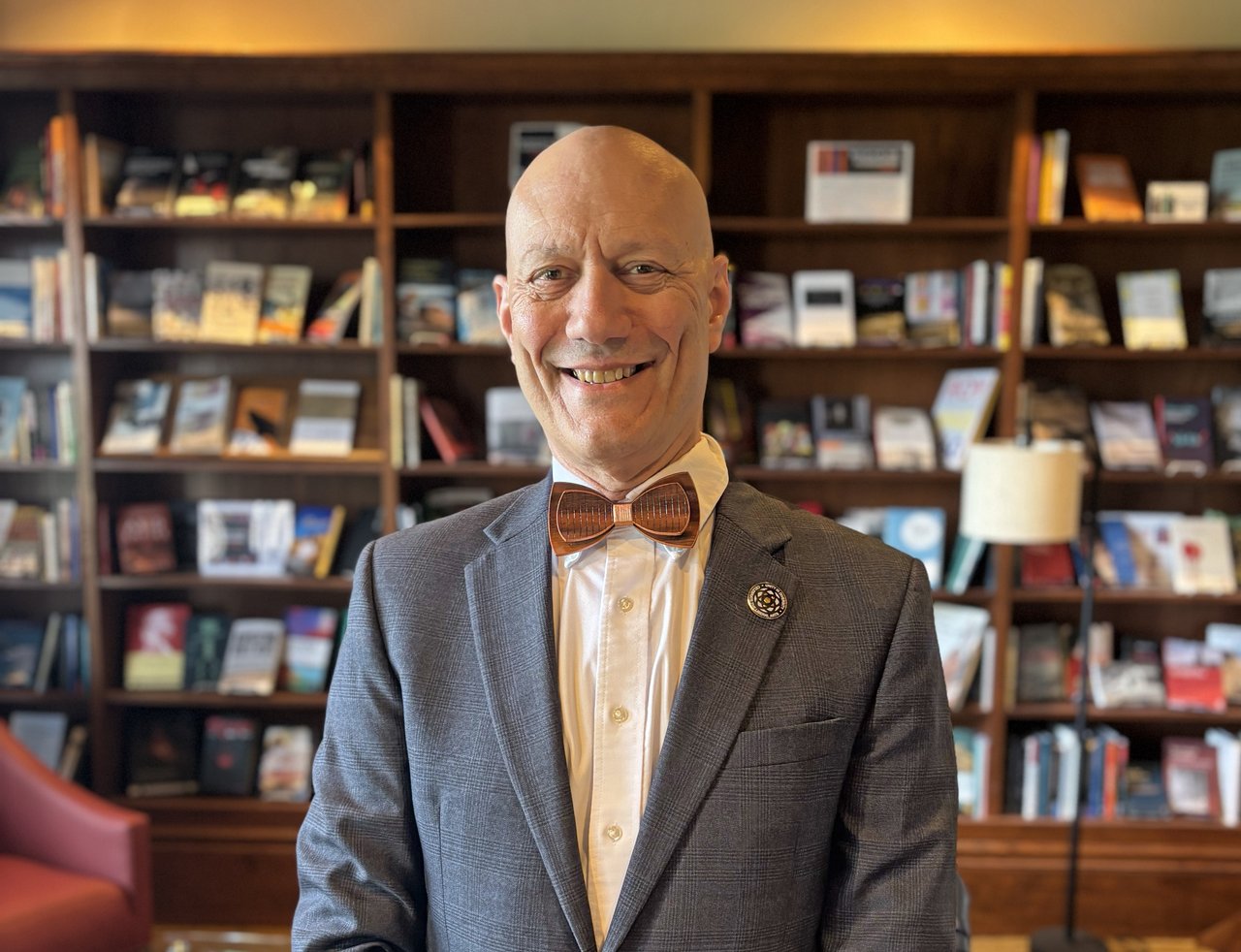
Career Highlights:
- Trusted Academic Leader: Served as A&S senior associate dean for academic affairs and chaired multiple departments, collaborating closely with several A&S deans and countless faculty and staff.
- Scholar. Teacher. Mentor. Convocation Host Extraordinaire. Shaped the academic and professional journeys of generations of faculty and students, while also serving as a familiar and guiding presence at graduation celebrations.
- Champion of the Liberal Arts: Advocated nationally for liberal arts education through essays in The Washington Post and an appearance on NPR’s Enrolled podcast, emphasizing a curriculum steeped in creativity, critical thinking and cultural awareness. Also helped to establish the Syracuse University Humanities Center, the heart of the humanities and liberal arts at SU.
From Miami to the Hill
Greenberg’s journey to Syracuse began in Miami, Florida. The youngest of three boys, he was raised in a household where education was deeply valued. His mother, a teacher, became the family’s primary provider after the passing of his father during Greenberg’s childhood.
“Education was always a very important thing in our household,” Greenberg recollects. “(My mother) had two sisters (and no brothers), and she always said that her father made them get degrees because he felt it was important—especially at a time when fewer women were pursuing higher education.”
Raised in Miami, Greenberg also encountered Spanish-speaking Cuban refugees who had escaped the Cuban Revolution of the 1950s. This early immersion in linguistic diversity ignited a lifelong fascination with languages.
“I learned Spanish from them,” he says. “I became intrigued by languages.”
But it was a televised moment during the Cold War that ignited his fascination with Russian—a language he would later study in college and eventually research and teach at Syracuse University.
“I remember watching Leonid Brezhnev walk off a plane in Washington, D.C., and start talking in Russian... I thought, wouldn’t it be cool to understand Russian.”
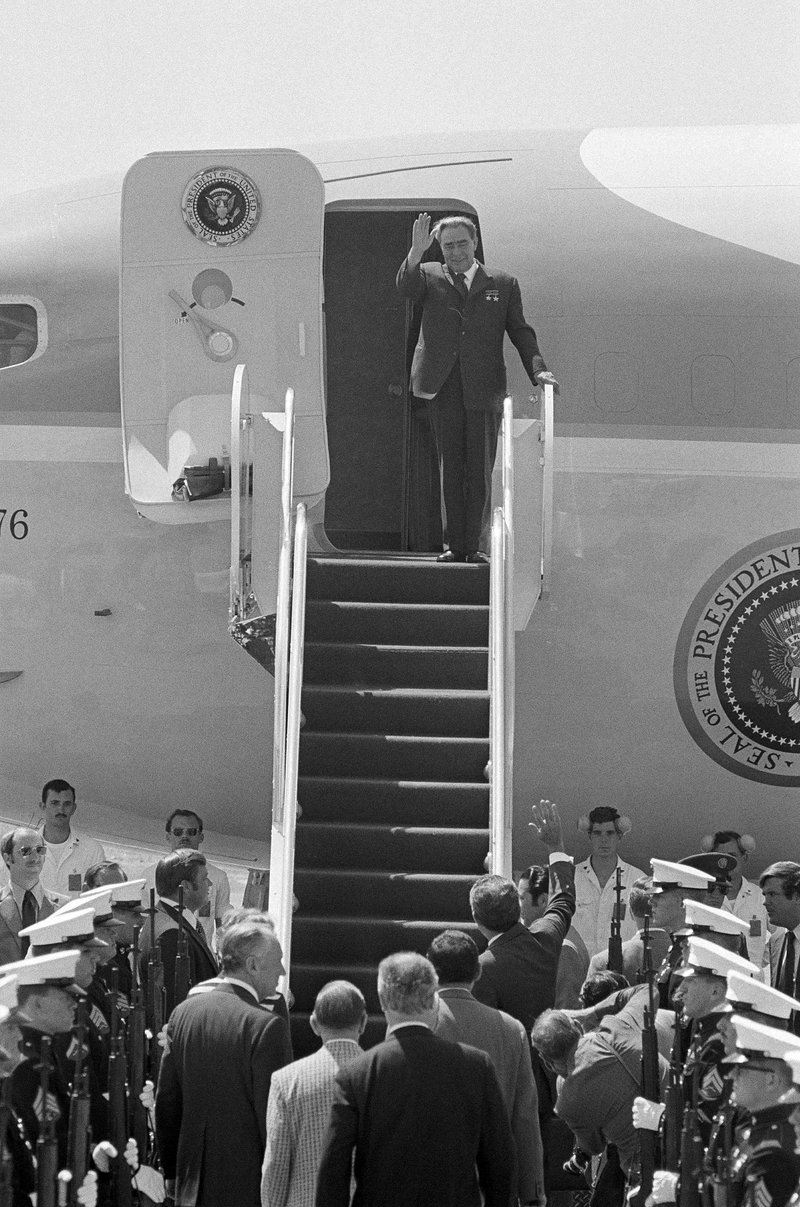
Leonid Brezhnev, former General Secretary of the Communist Party of the Soviet Union, in the doorway of a plane, waving to former U.S. President Richard Nixon and others during a trip to the United States. (AP Photo)
The language sounded familiar to him—it reminded him of his grandparents who came to America from Russia. Later, he told his mother he wanted to learn Russian. Greenberg notes: “As a classic second-generation émigré of that time, she replied, ‘We shouldn’t have anything to do with that old world. Don’t waste your time learning Russian.’”
Without any opportunities to study Russian in high school, he focused on science and mathematics but never lost sight of his interest in Russian. When it came time to choose a college, he sought a change from the heat and bustle of Miami. A brochure for Bucknell University, spotted on the edge of his guidance counselor’s desk, caught his attention. It offered strong programs in science, math, engineering and Russian, which he learned could fulfill a language requirement.
At Bucknell, it quickly became clear that Russian might shape both his academic path and future career.
“I spent way more time studying Russian than any other subject because I loved it,” Greenberg says. He developed a close relationship with the head of Bucknell’s Russian program, Robert Beard, a linguist whose teaching style resonated deeply.
“He explained things in a way that just clicked,” Greenberg recalls. “He spent time describing how the application of underlying rules could explain the existence of similarities and differences in linguistic forms (in Russian and in other languages) which otherwise made no sense.”
Though still a math major, Greenberg continued to take more Russian courses. Beard eventually connected him with a Hungarian math professor who spoke eight languages and taught logic and set theory: courses that revealed surprising parallels between math and language. “I started seeing similarities, and I really liked those math classes,” he says. “So, I tried out linguistics classes, and that’s when I fell in love.”
Another key influence was a woman—now his wife (Pat)—whom he met while living in Bucknell’s Foreign Language House. She had recently returned from a year abroad in France and was a double major in French and English. Her academic interests helped deepen his own curiosity about languages and linguistics.
During his junior year, Greenberg declared a double major in math and Russian.
“My mom wasn’t thrilled about the Russian major, but at least I was still doing math,” he says. “By the end of that year, I knew I wanted to focus on Slavic linguistics.”
A Serendipitous Arrival
Greenberg’s path to Syracuse was, in his words, “seemingly serendipitous.” Encouraged to study with Leonard Babby, a pioneer in the study and application of general linguistic theory to the study of Russian and Slavic languages, he earned his master’s degree and Ph.D. in Slavic linguistics at Cornell University. After enduring a few grueling winters in Central New York, he applied for the handful of jobs that were available. “My wife said, ‘Gerry, I don’t care where you get a job, as long as it’s not in Syracuse.’ And lo and behold, that was the only job I was offered.”
Despite the snowy welcome, Syracuse proved to be the perfect fit. The University’s strong Slavic presence, bolstered by its post-WWII role as the home of the Air Force language school, made it an ideal home for Greenberg’s academic interests.
An Air Force Training Ground
Syracuse University’s reputation in Slavic linguistics was significantly shaped during the Cold War era, when it became home to one of the largest and most intensive Russian language programs in the United States. In 1951, the University partnered with the U.S. Air Force Institute of Technology to train officers and airmen in Russian language and Soviet studies. Through intensive 6- to 12-month courses, students immersed themselves in Russian language, history, geography, politics and economics—preparing for strategic roles in national defense.
By the mid-1980s, Syracuse still retained faculty from the original Air Force language school cohort, and its library remained a treasure trove of Soviet-era materials. These enduring resources and institutional knowledge made Syracuse a prime destination for Greenberg.
A Dedicated Researcher, Teacher and Mentor
From the moment he stepped onto campus in 1985, Greenberg’s reputation as a scholar-teacher began to grow. Early publications and presentations quickly attracted attention to his scholarly work, particularly for his application of contemporary linguistic theory to Slavic data. Jim Lavine, professor of linguistics at Bucknell University and a longtime collaborator of Greenberg, recalls, “When I first encountered Gerry, he was among a small group of rising prominent linguists who applied contemporary theory to Slavic data.”
Their shared academic lineage through Babby, who was Greenberg’s advisor at Cornell and Lavine’s at Princeton, fostered a sense of scholarly kinship. Lavine notes, “Len’s students saw themselves as an academic family.” This connection deepened when Lavine joined Bucknell University in 2001, Greenberg’s alma mater, filling a position that arose from the retirement of Greenberg’s own undergraduate mentor, Bob Beard.
Over the years, Greenberg and Lavine collaborated on multiple projects. Their friendship extended beyond academia, with personal memories like Greenberg’s daughter Stacey babysitting Lavine’s child and even accompanying the family to Moscow in 2006. Lavine fondly remembers sitting with Greenberg in a hard rain on Bucknell’s quad during Stacey’s graduation, a moment emblematic of their enduring bond.
“Gerry has been a friend and close colleague throughout the 25 years of my academic career,” says Lavine. “It’s been a genuine delight to have crossed paths on so many occasions, both professional and personal.”
The enthusiasm and dedication he applied to examining the way Russian and Slavic languages work also permeated his interactions with students. His mentorship, humor and genuine care left lasting impressions on those he taught and advised.
Jilly Lederman, who received degrees in Russian and magazine journalism at Syracuse, vividly remembers her first class with Greenberg. “It was 8 a.m. on the first day of my first semester—Intensive Russian 101,” Lederman recalls. “Gerry was this tall, funny, quirky guy with a LOT of curly black hair who was a little intimidating at first. We joked that he looked like a Muppet, always waving his hands around.”
Lederman hadn’t planned to major in Russian, but Greenberg’s teaching changed her path. “His classes were fast paced, which I loved,” she says. “Combined with his sense of humor, it made for a really great experience. Later, he mentored me personally, even buying me a Russian linguistics workbook and giving me mini lessons. He took me to a linguistics conference at Cornell and introduced me to his mentors. That day changed my life.”
She went on to earn a Ph.D. in Slavic linguistics and later taught Russian at the University of Virginia, Rochester Institute of Technology and Nazareth College—using the same textbook she had once studied in Greenberg’s class. “I had come full circle. I just lacked the hairdo,” says Lederman, who now teaches English at the BART (Berkshire Arts and Technology) Charter Public School in Pittsfield, Massachusetts, continuing her lifelong interest in language learning.
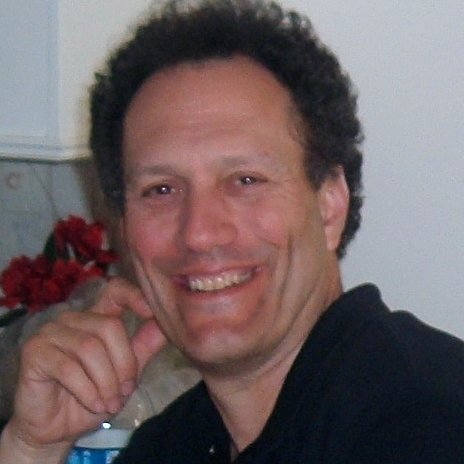
Greenberg posing for a photo around the turn of the century.
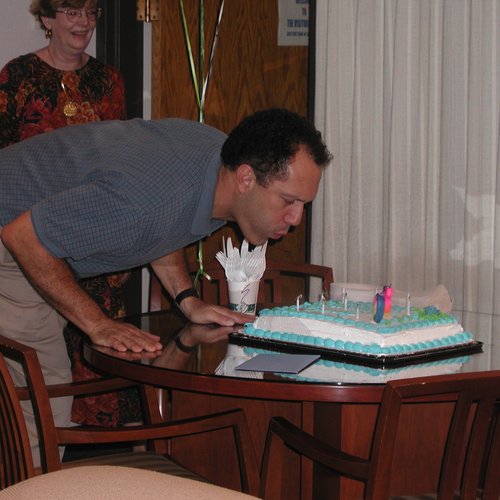
Happy 50th! Greenberg blowing out candles during his golden birthday celebration.
Stephen Barton was another student who received valuable mentorship from Greenberg. Although he never took a class with him, due to Greenberg’s growing administrative duties at the time, he still felt his impact.
“I met Gerry when I was deciding between Russian and German. He candidly told me to pick Russian—it fit my interests better. That advice led me to a Fulbright scholarship and a career in public service,” says Barton, who is now a speechwriter and director of intergovernmental relations for Senate Democratic Leader Charles E. Schumer.
Barton later served on the A&S Dean’s Advisory Board, where he reconnected with Greenberg. “Even as an administrator who never formally taught me, his words of advice had a profound and positive impact on my life.”
Fit to Lead
While his time at SU was marked by a passion for teaching and researching language and linguistics, it was his ability to lead and support units throughout A&S that would define much of his career.
➡️ Greenberg Through the Years: Click here to explore a historical timeline featuring his scholarship and Syracuse moments.
From 1997 to 2003, Greenberg served as chair of the Department of Languages, Literatures and Linguistics. His service also stretched far beyond his home department, exemplifying his collaborative spirit and readiness to assist wherever needed. Over the years, he was also interim chair or director for many A&S departments and units including English, philosophy, religion, women’s and gender studies, writing and rhetoric, African American studies, linguistic studies and the Syracuse University Humanities Center.
Behzad Mortazavi, Dean of A&S, notes Greenberg’s lasting influence across the College: “Department chairs are unsung heroes. For Gerry to step in as interim chair more times than I can count really speaks to his readiness to help without drama or fanfare. He was (and still is) always 100% focused on helping students, faculty and staff succeed.”
Vivian May, who became the director of the Syracuse University Humanities Center after Greenberg’s interim stint, says, “Gerry helped realize the faculty's vision for a university-wide Humanities Center. He has been truly generous with his time, regularly stepping up to help individuals and units across the College.”
May also highlights his quiet mentorship. “Gerry sees capacity and potential in people when they may not yet see it in themselves. Thanks to a little nudge of encouragement from Gerry, I’ve seen countless people grow as scholars, educators and leaders—including myself.”
Diane Drake, assistant director of the Humanities Center, recalls her first impression of Greenberg. “Ten years ago, when I applied sight-unseen from out-of-state, Gerry became the ‘face of Syracuse University’ for me. His commitment to the College and the Center was clear. I continue to send him a ‘thank you’ message every summer on my start date anniversary."
The Dean’s Right Hand
In 2003, he was appointed associate dean for humanities at A&S under then-Dean Cathryn R. Newton. Reflecting on his early contributions in that role, Newton notes that he led a $9 million renovation of the Tolley Building for the humanities and interdisciplinary programs, co-conceived the relocation of the Community Folk Art Center and the Paul Robeson Performing Arts Company, and collaborated with the Humanities Council and her team to establish the Humanities Center at Syracuse University.
“We are all in his debt for the work he did to strengthen the humanities and the College of Arts and Sciences in those years,” says Newton.
In 2008, he served briefly as interim co-dean of the College, and in 2009, he was named senior associate dean. In this role, he was instrumental in shaping academic policy and supporting both faculty and students by overseeing academic programs, assisting with strategic planning and faculty affairs, guiding curriculum development and implementation, and contributing in whatever capacity he was able to support College or University functions and initiatives.
An integral member of the A&S dean’s office for the past two decades, Greenberg served as a trusted advisor to Newton and subsequent deans George Langford, Karin Ruhlandt, Lois Agnew and Behzad Mortazavi. He helped each leader implement their vision and navigate the complexities of the University's largest, most academically diverse college.
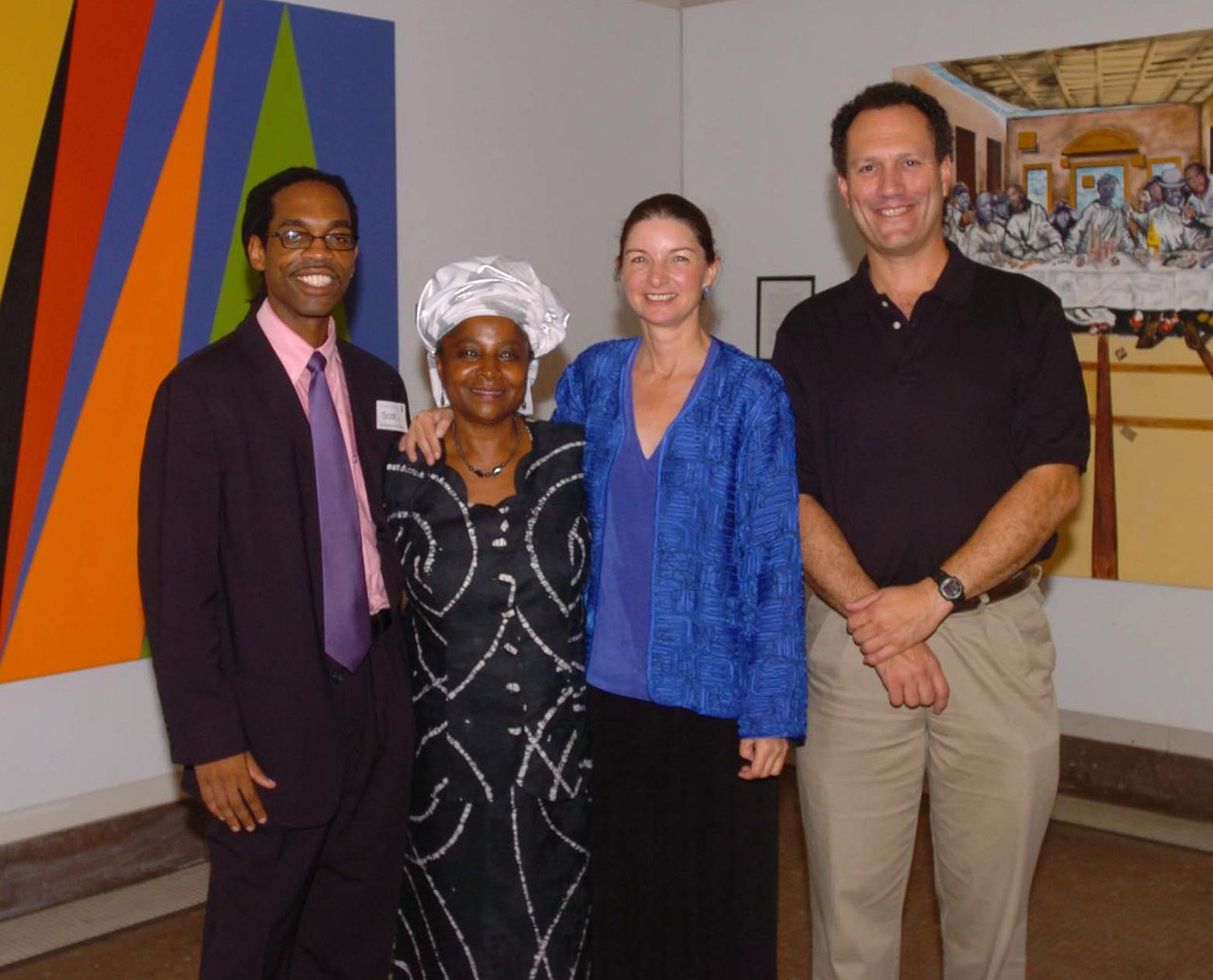
Dean Emerita Karin Ruhlandt described Greenberg as indispensable. “I would not have been able to do my job as Dean without Gerry’s amazing support,” she says. “His institutional knowledge is unsurpassed. He was the first person I called with a question or challenge.”
She also shared a memory from her early days as dean. “We were tasked with creating a budget plan. Gerry, our budget director, and I spent many late evenings working on it. That’s when I truly saw his dedication, intellect and analytical skills.”
Dean Emeritus George Langford echoes those sentiments. “Gerry’s support was pivotal during my tenure,” he notes. “His deep institutional knowledge helped the office run smoothly. He worked tirelessly behind the scenes, often remaining calm and composed while others were overwhelmed.”
Langford recalled a signature moment during the dedication of the Life Sciences Complex. “Gerry crafted a meticulous, minute-by-minute itinerary and appointed himself my ‘handler.’ His thoughtfulness turned what could have been an overwhelming day into a joyful celebration. From that moment on, we forged not just a working partnership, but a lasting friendship.”
Greenberg’s influence has been felt by every dean he served, each of whom relied on his insight and support to guide the College through times of change and growth. A&S Dean Behzad Mortazavi reflects on Greenberg’s legacy with deep appreciation.
“Working with Gerry has truly been a privilege,” says Mortazavi. “He’s one of those rare people who makes everything run smoother just by being involved. I’m incredibly grateful for his guidance and friendship—and I hope retirement brings him all the joy he’s earned.”
Champion of the Liberal Arts
Greenberg’s passion for the liberal arts is perhaps his most enduring contribution to higher education in general. Promoting their value on national platforms, he published a trilogy of essays in The Washington Post and appeared on NPR’s Enrolled podcast, where he articulated the value of a well-rounded education rooted in creativity, critical thinking and cultural awareness.
In his Washington Post essay, "The Tao of the Liberal Arts," he drew together parallels stemming from his longstanding interests in both the liberal arts and Daoism.
“The Tao or Dao refers to the natural way of the Universe,” says Greenberg. “I just had this sort of ‘aha’ moment that the liberal arts is akin to the Tao. Everything is a part of the Tao. So that's how I came to that understanding of, you can't define the liberal arts. When you start and try to define it, you start to demean what it is. You really have to experience it.”
He notes that much of this work was shaped by his service on the Board of Directors for the Council of Colleges of Arts and Sciences, which he credits as pivotal to his understanding and appreciation of the liberal arts.
Greenberg’s commitment to education and the liberal arts also extended into his family life. Together, he and his wife raised two daughters (Stacey and Robin) who both pursued liberal arts double majors and advanced degrees. Greenberg takes pride in how his family reflects the values he championed throughout his career: intellectual curiosity, interdisciplinary learning and a lifelong dedication to education.
Looking Back and Looking Forward
As his time at Syracuse University draws to a close, Greenberg also reflects fondly on the many Convocations he helped lead as associate dean. Being part of these graduation ceremonies which celebrate student achievements and foster a deep sense of community and pride within the University was a career highlight for him. “I will miss the congratulations and cheering,” he says. “The fact that we always pulled them off smoothly was quite satisfying.”
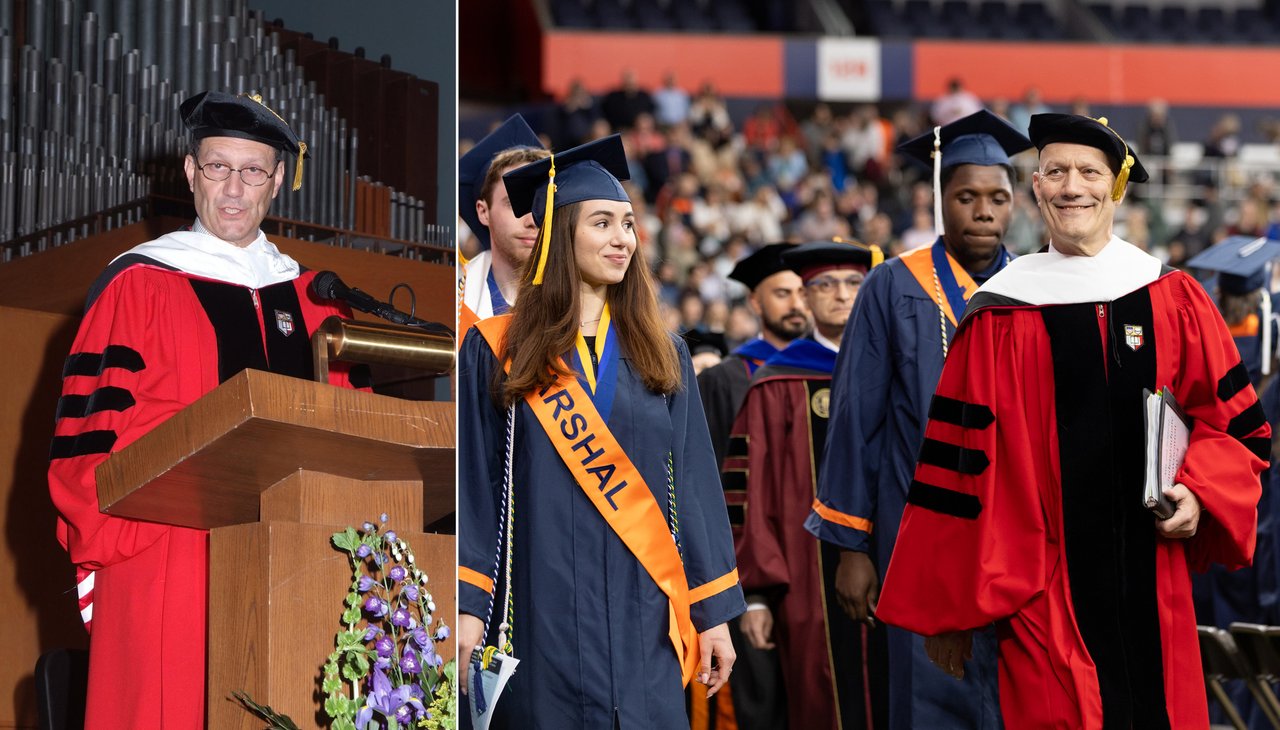
What others will miss is his wit, warmth and unmistakable sense of style—especially his signature bow ties, which reflect his playful, yet dignified personality. Inspired by a quirky eighth-grade science teacher who once fashioned one from a dollar bill, Greenberg embraced the accessory as a personal trademark.
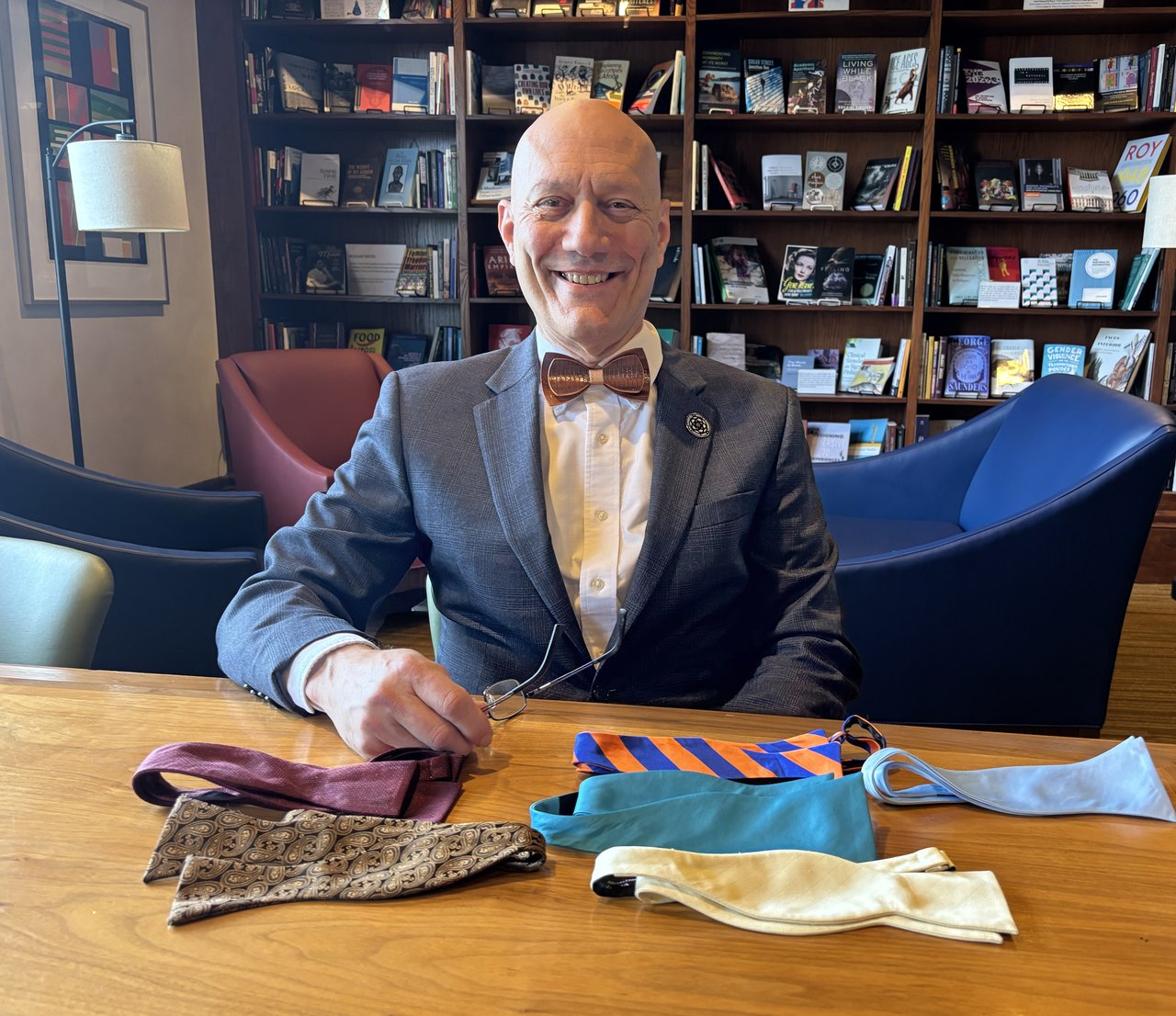
Looking ahead, Greenberg hopes to explore new creative outlets in retirement, including learning Chinese, an interest sparked by his lifelong fascination with Taoism. He also hopes to dive deeper into world percussion, a hobby he’s already begun with a collection of hand drums from around the globe.
➡️ Quick Q&A with Gerry Greenberg
With his tenure at Syracuse nearing its end, his influence remains deeply embedded in the programs he developed, the students he mentored and the colleagues he supported.
“Gerry served the College with distinction,” says Langford. “His work strengthened the institution at every level, and his legacy is felt in the stability, integrity and collegial spirit that defined our shared time in leadership.”
As Gerry Greenberg steps away from his decades-long career at Syracuse University, his words offer a fitting reflection on a career shaped by curiosity, service and a deep commitment to learning. “My life is a continual example of broadening horizons … At the heart of this is continuing to learn about new things and seeing things from different perspectives.”
➡️ Faculty and Staff Reflections
Published: Sept. 10, 2025
Media Contact: dtbernar@syr.edu
